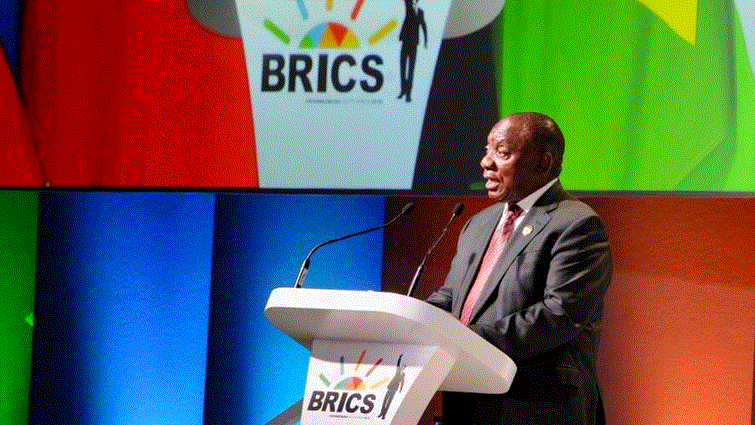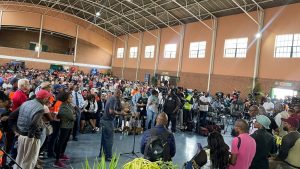President Cyril Ramaphosa has hailed the first decade of the existence of BRICS as a major success in global developmental agenda. Ramaphosa was speaking at the official opening of the BRICS business summit currently underway in Sandton. The meeting brings together leaders and businessmen from Brazil, Russia, India, China and South Africa.
President Ramaphosa says over the past ten years, the bloc has made enormous strides in a number of co-operation areas including climate change and promoting sustainable development.
All heads of states will receive a consolidated report of the BRICS Business Council that reflects all the work that has been done on BRICS Corporation at a business level over the past year.
Trade and investment between the BRICS has been growing impressively over the last few years – averaging 5.1% last year. India and China are growing faster than the rest of the other BRICS countries.
Other achievements made by BRICS include the BRICS bank. Since its formation the bank has disbursed loans totalling 5.1 billion dollars, with approvals amounting to 1.7 billion dollars this year alone.
“Intra-BRICS cooperation has been gaining momentum in areas such as finance, agriculture, trade, combating transnational crime, science and technology, health, education, security and academic dialogue. One of the most important achievements of the first decade of BRICS was the establishment of the New Development Bank, which fills a critical gap in project funding,” President Ramaphosa says.
His counterpart Chinese President Xi JinPing warned that there would be no winner in any global trade war. China explained its position regarding the current trade war it is facing with the United States.
US president Donald Trump imposed tariff increases of more than 500 billion dollars on Chinese goods exported to the U.S.
Speaking through an interpreter, President Xi JinPing says protectionism will severely blow the prospects of multilateral trading regime.
“The international community has again reached a new cross roads. Should a trade war be rejected there will be no winner …. ”
Minister of Trade and Industry Rob Davies highlighted to delegates achievements made over the past five years by BRICS countries in the area of corporation around trade and investment relations. He says trade between BRICs needs to increase.
“And then we have developed a number of additional sectorial engagements which are relevant to different parts of our programme. But in the area of trade and investment relations, I think the two that stand out is that we now have regular meetings of industry ministers as well as now small business ministers. We noted that intra-BRICs investment remains a relatively small part of total BRICS investment. In fact the figure that we became aware of is that its six percent of total BRICS foreign investment. And this points to the need to strengthen investment relations.”
This is the first time President Ramaphosa has hosted the summit following his election as President in February. The summit is expected to strengthen relationships between BRICS and Africa and BRICS leaders are also interacting with other African Presidents.
The BRICS bloc has 41% of the world population and control 23% of global GDP worth about 40 trillion dollars. The President highlighted a wide range of investment opportunities in South Africa . These include renewable energy, recycling, water infrastructure, energy, mining, agriculture, tourism, aerospace and defence.
More growth and investment
At a media briefing in Johannesburg, where the BRICS summit has officially kicked off an emphasis was made on encouraging growth and investment.
At the centre of BRICS nations’ concerns is increasing trade tariff wars between the US and China, in particular.
United States President Donald Trump is threatening to impose further tariffs on China’s products, while the Asian giant vows to retaliate.
Trade and Industry Minister Rob Davies is worried that emerging markets could easily suffer collateral damage as a result of this trade stand-off between the world’s two biggest economies.
According to Davies, South Africa is likely to lose its benefits arising from African Growth and Opportunities Act, otherwise known as AGOA.
The Act enhances market access to the US for about 40 Sub Saharan countries, including South Africa.
Local businesses are also worried that a move away from multi-lateral trade is bad for their growth.
In the next two days, issues such as trade liberalisation, fourth industrial revolution and a plethora of other developmental topics will be discussed.
Other African leaders will join the dialogue from Thursday.
The summit ends on Friday.






